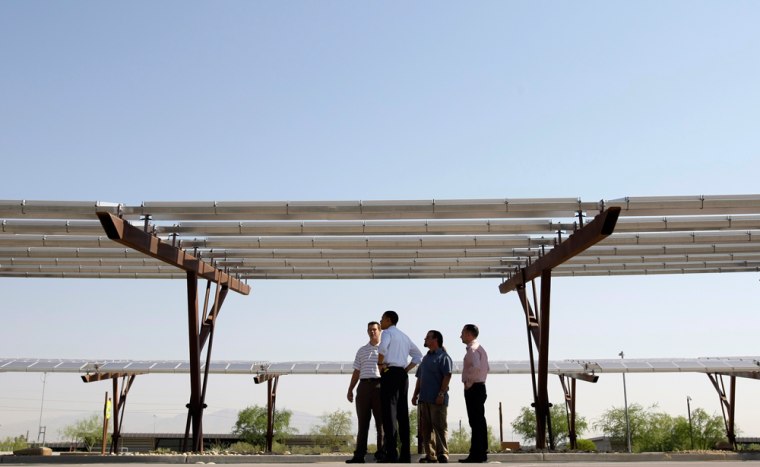Al Gore has a competitor for title of America's climate crusader. His name is Barack Obama, and of all his immediate foreign policy changes none will mark as big a shift from the Bush administration as his approach to cutting carbon emissions, the leading cause of global warming.
"President Obama will be like night and day compared to President Bush," Sen. John Kerry, D-Mass., told reporters this week at U.N.-sponsored climate talks in Poznan, Poland.
Obama's administration will mark a new era in U.S. climate policy, one eagerly awaited by countries and environmental groups that believe global warming is the most urgent problem facing the world today.
The Bush administration has steadfastly refused to sign on to the 1997 Kyoto Protocol, which requires the 37 industrial nations that have agreed to the pact to reduce emissions to just below 1990 levels by 2012.
Obama wants to cut U.S. emissions of carbon dioxide and other greenhouse gases back to 1990 levels by 2020. Bush rejected the Kyoto Protocol. U.S. emissions now run 17 percent above 1990 levels, and his policies would allow them to keep rising until 2025.
Obama's approach would set a cap on emissions but also allow companies to share emission allowances if one company runs over its limit and another is below its ceiling. Bush opposed such mandates and instead promoted finding technological solutions.
Obama also is betting that pumping public money into "green jobs" tied to climate and energy policies can help pull the country out of recession.
The Senate and House are controlled by Democrats, so a green stimulus and a cap-and-trade program are on a fast track.
Obama has nominated an alternative fuels guru, Nobel-award winning physicist Steven Chu, to be the nation's energy secretary, and is creating a White House office on energy and environment to be run by Clinton-era EPA chief Carol Browner.
Buzz in the air
Abroad, Obama will have plenty of support for his dramatic departure from Bush's policies.
"As I walk around the hallways, I hear lots of different dialects and languages — and then 'Obama, Obama, Obama,'" Gustavo Silva-Chavez, a climate analyst with Environmental Defense, said during the Poznan talks. "So definitely a lot of the negotiators here understand that it's the end of the Bush era and the beginning of the Obama era, and they're very excited about that."
Brice Lalonde, the chief French delegate to the talks, said Europe was "thrilled" with Obama's promises to pursue renewable energies. If the U.S. commits itself to ambitious environmental goals, other countries will be forced to take bold steps themselves, he said.
Obama has promised to invest $15 billion each year to support private-sector efforts toward clean energy, arguing that tackling climate change can create millions of new jobs as the U.S. invests in technologies to promote solar and wind power, biofuels and cleaner coal-fired plants.
Hurdles ahead
But there are obstacles. With a recession and financial bailouts at home, Obama might not get as much funding as he'd like.
Activists also fear Obama will not be able to quickly reduce the U.S. appetite for coal and oil, increase the fuel efficiency of American cars or fight powerful economic interests like the oil industry.
The talks on where to go after the Kyoto pact expires in 2012 are behind schedule due to bickering. Participants had hoped to have a new roadmap by December 2009.
Kerry, in Poznan as soon-to-be chairman of the Senate Foreign Relations Committee, said it was "absolutely essential" that China, which has overtaken the United States as the world’s top carbon dioxide emitter, gets more involved in combating global warming to win U.S. endorsement of any new treaty.
China, however, insists that rich nations should first make deep cuts at home. India happens to back China on this.
The transitional state of U.S. politics hasn't helped speed things up, either.
"The immediate effect is a stalling of discussions," said Kim Carstensen, the World Wildlife Fund's chief official on climate change. "It's a sort of black hole. But in the larger picture, we are definitely hopeful."
Jake Schmidt, international climate policy director for the Natural Resources Defense Council, shares that longer-term view. Obama "gets global warming," he said, "and understands that its solutions are also at the heart of solving our financial situation through the creation of millions of green jobs."
